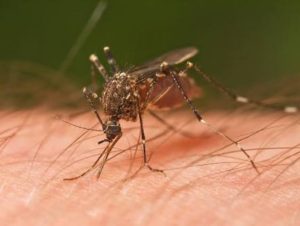 Researchers have found that mosquitoes are now becoming resistant to insecticides in recent times, which is now a serious concern and threat to malaria control.
Researchers have found that mosquitoes are now becoming resistant to insecticides in recent times, which is now a serious concern and threat to malaria control.
Recently, there have been many researches towards elimination of malaria and its vector in Nigeria. There have also been huge investments to increase the quantity of insecticides used for malaria control, scale up of the distribution of long-lasting insecticidal nets (LLIN) and use of indoor residual spraying (IRS).
Despite all these efforts, there are growing concerns that emerging resistance to insecticides among Anopheles mosquitoes and to antimalarial medicines among Plasmodium parasites, if left unchecked, could lead to a substantial increase in malaria incidence and mortality.
According to the World Health Organisation (WHO), resistance is known to affect all major malaria vector species and all four recommended classes of insecticides. Since 2010, a total of 60 countries have reported resistance to at least one class of insecticide, with a total of 49 of those countries reporting resistance to two or more classes.
According to a study led by Charles Wondji of the Liverpool School of Tropical Medicine, with Kayla Barnes, Gareth Weedall and colleagues in journal PLOS Genetics, genetic analysis of mosquito populations in Africa shows that recent successes in controlling malaria through treated bednets has led to widespread insecticide resistance in mosquitoes.
However, according to the WHO, the understanding of the extent of the problem is incomplete, because: many countries do not carry out adequate routine monitoring for insecticide resistance in local vectors; and monitoring data are often not reported in a timely manner.
Previous researches indicate there are four classes of insecticides- pyrethroid, organochlorine, organophosphate and carbamate) recommended for malaria control of which only pyrethroid was approved for use on LLIN. It has been shown that the loss of this insecticide’s effectiveness will lead to increase in preventable deaths, particularly in most vulnerable groups, hence the need to maintain the effectiveness of LLIN in era of growing resistance.
A recent study carried out by scientists at the Nigeria Institute of Medical Research (NIMR), Yaba, Lagos, revealed that mosquitoes in 18 states in Nigeria have developed resistance to the LLIN insecticide nets, with Lagos, Ogun and Niger state having the highest incidence of cases.
Other states where the resistance were also detected include Jigawa, Katsina, Kebbi, Sokoto, Zamfara, Benue, Kwara, Nasarawa, Plateau, Anambra, Enugu, Rivers, Ondo, Osun and Oyo state, with the outcome of the study identified as a major threat to the eradication of malaria in Nigeria by 2030.
The Nigerian National statistics showed that malaria accounts for 60 per cent of hospital outpatients visits, 25 per cent infant deaths, 30 per cent of under-five deaths and 11 per cent of maternal mortality annually, although, currently, the prevalence of malaria in Nigeria is 27 per cent.
The lead researcher and the Deputy Director & Head, Public Health Department, NIMR, Dr. Sam Awolola, in his paper titled: “Need to Mitigate the Effect of Insecticide Resistance in Malaria Control in Nigeria” said, the result of the study meant that Nigeria would record a shocking increase in malaria deaths in the states where mosquitoes had developed resistance to these insecticide nets without swift intervention, adding that over 182 million long-lasting insecticide-treated nets have been distributed since 2003 till date recording 16 per cent reduction rate in 2008 to 2011 which have not been sustained.
Awolola who stressed that one of the consequences of the development would be more deaths from malaria, which are imminent in the affected areas, blamed the new trend of resistance to use of some reagents on agricultural products, saying “basically, one of the major factors that contributed to insecticide resistance is the use of some reagents for agriculture globally. Most of the insecticides used in public health are also used in agriculture, which is a major source of resistance.”
He noted that there should be strategic plans and policies to curb the widespread of these insecticide resistances, in which if no pre-emptive action is taken in Nigeria, it will likely, have significant operational impact.
“The LLIN Universal Coverage gap for Nigeria will remain unmet when generic LLINs are deployed in areas with high levels of metabolic-based insecticide resistance, as consequently, the level of efficacy intended might not be met.” He added: “Resistance data needed for evidence-based planning are limited in a number of state Ministries of Health because of the lack of capacity to carry out resistance tests, and if nothing is done in the country, insecticide resistance could eventually lead to widespread operational failure and much of the gains made in malaria prevention and control could be lost.”
Meanwhile, the WHO has recommended an immediate and pre-emptive action to delay resistance, which requires the use of tools with proven optimal efficacy to be deployed rationally as part of an evidence-based Insecticide Resistance Management Strategy,
The search for an alternative measures for the insecticide resistance has gained momentum with NIMR identifying a new generation combination LLIN (PBO-LLIN) and IRS Insecticides (pirimiphos-methyl (acetylic CS) and Ficam to have improved efficacy against the pyrethroid resistant mosquitoes in Nigeria, which was also revealed at the institute.





